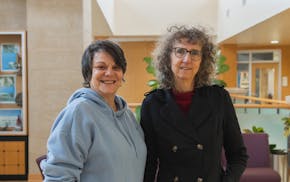After completing pre-med requirements at the College of St. Benedict, Joy Benson realized that the odds against getting into medical school required a backup plan. She signed up for the Biomedical Technology program at Anoka Ramsey Community College, which offers a one-year certificate in clinical research for people with strong science or medical background.
"Clinical research is the human testing of a medical device or drug to study the effects," Benson said. "When a person participates, data is collected, analyzed, published or used by a company to submit to the Food and Drug Administration (FDA) or another country's equivalent to request approval."
She completed the program in 2001 and, through her internship, got a job at AGA Medical as a Clinical Research Coordinator. "With that job I did some data entry, managing documentation," she said. Her next job, at Medtronic, was as a Clinical Research Administrator, and she held similar positions at Restore Medical and Medtronic. "There's a lot of travel and a lot of data monitoring," Benson said. "You sit with the hospital medical records and review the patient data to make sure it's all clean and documented correctly."
In January 2010, she moved to Galil Medical as a Clinical Research Associate. "In designing the study, you're helping determine which patients are the best candidates." Benson said. That means ongoing research and review of medical journals. "I travel a fair amount, working with physicians and hospital staff to assure that research is ethically conducted, with good documentation, to get the data we need," she said.
"I love the opportunity for learning, working in the medical field, being on the cutting edge of things. I work with a lot of really innovative, gifted people -- physicians, hospital staff, engineers within the company. That's very exciting too."
How is the job market in clinical research?
When you get some experience, especially because we have so many device companies here in Minnesota, there's a good job market for you.
What's the ideal background for the Clinical Medical Research Professional program?
Biology is good, and a nursing background is also ideal. I started as a biology major with an English minor, and ended up being an English major. A doctor told us, "If you have interests besides the sciences, do those now. You may not have time later." I have all the requirements for med school. Every trip I take, I write a report, and I do lots of correspondence. The English background helps in these communications.
What are you working on now?
Galil is an oncology company. We're doing a five-year post-market study on cryoablation for kidney cancer. Alternative procedures are removing part or all of the kidney. With this device, they can avoid that surgery. They can save complications and the long hospital stay. That's exciting to know there are less invasive options out there. We're also studying cryoablation in the lung and bone.
What are some of the challenges of the job?
It's disappointing when you do a study and the device doesn't work as well as anticipated. I haven't had that happen very often. You definitely get invested.
Do you ever wish you'd gone to medical school?
There are times I wonder how medical school would have worked out, but I'm happy. I'm not directly performing patient care, but it's very related. All the science and anatomy I took is definitely put to use. Sometimes when I look at the hours and schedules doctors keep, I think it worked out for the best.
